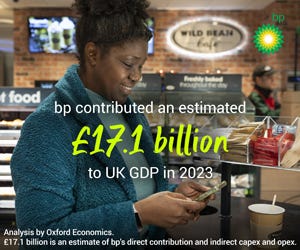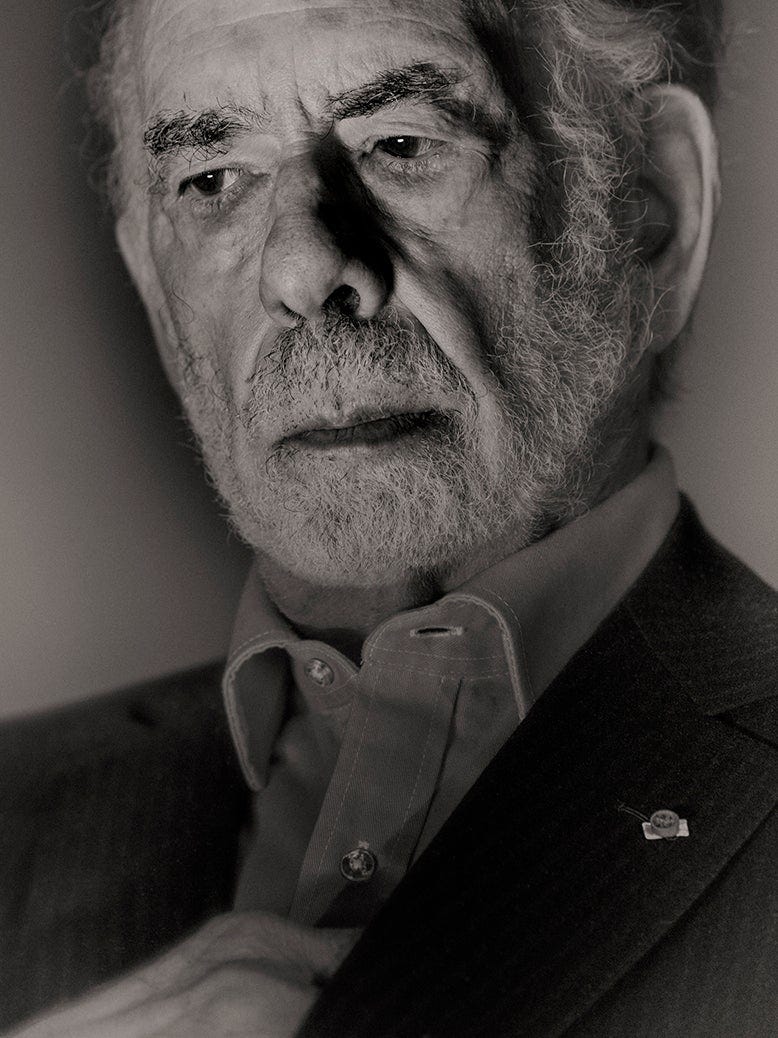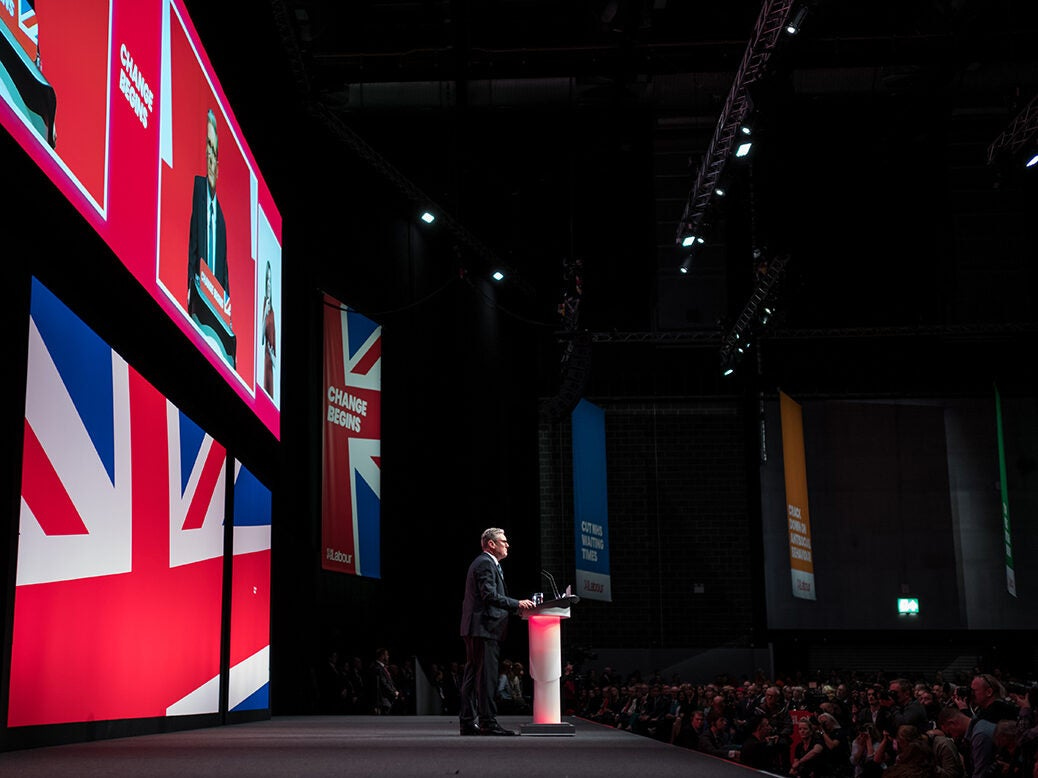The Saturday Read: Crying havoc
Inside: Nasrallah, Gove, Chappell Roan, Starmer, Coppola, and Dua Lipa.
Good morning. Welcome to the Saturday Read, the New Statesman’s guide to politics, culture, books, and ideas. This is Jason, together with Finn, Nicholas, Pippa and George.
The Spectator magazine has a new editor, Michael Gove. His appointment was a surprise to many at Westminster, and among the Spectator staff, but not to the New Statesman: our media columnist Alison Phillips reported several weeks ago that he had been offered the job. The conservative magazine is adept at changing editors… from Alexander Chancellor to Charles Moore to Dominic Lawson to Frank Johnson to Boris Johnson to Matthew d’Ancona to Fraser Nelson and now to Michael Gove. The process happens as smoothly as the transition from one Doctor Who to the next and Fraser Nelson leaves the editor’s chair, as d’Ancona did before him, with elegance, grace and, one presumes, a large pay-off. “There’s never a good time to leave a job like mine but… there is an obvious time,” he wrote.
The time was obvious because the Spectator has a new owner, Paul Marshall, who made his fortune through the Marshall Wace hedge fund. He also owns and has invested in the UnHerd website and paid £100m for the Spectator (broadly five times revenues), which he believes has suffered from “underinvestment”. Nelson’s mentor, Andrew Neil, had already resigned as chairman.
The new “independent” chairman is Charles Moore (aka Baron Moore of Etchingham), who became editor of the Spectator at the age of 27 and still writes a column for the magazine. I used to read Moore’s Spectator (alongside Martin Jacques’ Marxism Today) when I was a student and admired its intellectual ambition: among the regular contributors were Ferdinand Mount, Noel Malcolm (who wrote the weekly politics column before disappearing behind the battlements of All Souls College to study Hobbes), Timothy Garton Ash (on European politics) and Ian Buruma.
Nelson was a successful editor of the Spectator, not least because he was smart enough to leave the formula of the magazine and most of the columnists (Moore, Matthew Parris etc) he inherited unchanged. But he never seemed particularly interested in political or literary essays or the history of ideas, and as a reader one turns to UnHerd, not Nelson’s Spectator, for significant writing on post-liberalism, the American New Right and conservative thought.
I expect that will change under Gove, whom I knew a bit when we were colleagues at the Times in the mid-1990s. Back then the Times was headquartered in an old, windowless, converted rum warehouse in Rupert Murdoch’s Fortress Wapping. Gove was a leader-writer and sat above me on a mezzanine, close to the editor’s office. I was on the overcrowded ground floor and sat with a group of feature writers, who included Giles Coren (we mostly chatted about cricket and sometimes books while trying to avoid being commissioned “on the day”). Gove was ostentatiously polite, already close to the Murdochs, dining with David Cameron, Dean Godson and other ambitious young right-wing intellectuals, and on his way to Westminster.
Gove becomes Spectator editor just as Tortoise Media, a well-funded digital start-up run by James Harding (another former Times man) is negotiating to take control of the Observer. Its current owner, the Scott Trust, wants to offload the loss-making paper but resistance from staff inside the Guardian Media Group is fierce. Harding has promised to invest £25m over five years in the Observer, which has no discrete website or digital profile or newsletters such as the Saturday Read (thank you to our 200,000-plus subscribers!); its journalism at the weekend is published on the Guardian website. The question, therefore, is: if the Spectator is worth £100m, why is the Observer, the self-styled world’s oldest Sunday newspaper no less, valued at only £1? All change in the age of the new digital media barons.
The picks…
Good morning, Finn here. There are extraordinary reports emerging from Israel this morning - that Hezbollah leader Hassan Nasrallah has been killed after airstrikes in Beirut. If confirmed, this will mark a significant turning point amid the recent weeks of escalating hostilities in the Middle East. Lawrence Freedman wrote our cover story about a region on the brink.
Meanwhile, Sally Rooney meets Fintan O’Toole; and, in my top pick of the week, David Sexton has some harsh words about Francis Ford Coppola’s new film. Freddie signs us off with a note from Washington DC. As ever, have a great weekend and thanks for reading.
1—“A sort of deadly equilibrium”
Nearly one year on from the atrocities of 7 October, the Middle East is on the precipice of all-out war. Lawrence Freedman – with his calm and even hand – works out how we got here. FMcR
Israel is playing down the prospect of a land incursion, but this cannot be ruled out should Hezbollah fail to agree to a ceasefire. In addition, as Hezbollah is in some disarray, the IDF may see this as the optimum moment for what will still be a risky operation. As there are limits to what it can do with its missiles and rockets, Hezbollah may see a land battle as an opportunity to fight on its own terrain and get the population onside as it resists a foreign invasion. After months of fighting in Gaza, the IDF will not want to get bogged down in southern Lebanon in another war it cannot work out how to end. The last time the IDF occupied southern Lebanon in 1985 it got stuck, and when it left in 2000 Hezbollah moved back to the border.
2—“We do people a disservice by infantilising them”
Free speech is being shut down in the very areas we would expect to see it flourish: universities, publishing, the arts – even scientific research. Hannah Barnes charts how creeping censorship captured Britain’s liberal establishment. PB
Academics tell me there are several dangerous areas in higher education. Race and empire constitute one: in 2021, when Robert Skidelsky wanted to make a change to a module he taught, he was told to specify how the change “broadened epistemological and ontological horizons by moving away from a white, Eurocentric curriculum”. Also cited are gender (it is not acceptable to say biological sex is immutable), net zero (one cannot question the policies and trade-offs required to achieve it), the war in Ukraine and the Israel-Palestine conflict. Certain viewpoints are “right”, and others not even up for discussion.
3—“I’ve read postmodern theory and I know that’s all made up!”
Sally Rooney speaks to the Irish journalist Fintan O’Toole about her new book Intermezzo, the novel as a form, and how religion may or may not provide a guiding light through a “brutal, capitalistic world” (answers on a postcard, please). FMcR
If you look at, say, Austen, so much of the narrative momentum comes from the fact that the romantic – and of course the erotic – is totally suppressed from language: it can’t be discussed openly. The only way in which it can be acknowledged is through the marriage plot, and so that act of suppression is part of the drive of those novels. We know that the characters are attracted to one another, but it all has to remain within the boundaries of the late 18th-, early 19th-century novel, that form of language. Of course, that all was exploded with modernism, and now you can write anything: you can put all kinds of swearwords into your books and you’re allowed to say whatever you want. But that creates a problem for the novelist, because it’s like, “Oh, now where does my narrative drive come from? Nothing is excluded from the text of a novel, so where’s that subterranean push coming from?”
4—“The American sports-industrial complex has come to town”
From Hollywood investors to the row over government regulation, there is a battle for the soul and soil of English football. Clive Martin asks if the national game can resist American occupation – or if the hostile takeover is already complete. NH
Perhaps, our last hope must be that this American interventionism fails in the way American interventionism usually does. That their habit of turning up, gung-ho in a foreign culture, with little to no understanding of what they’re doing will eventually send them packing with their tails between their legs. That the land of English football is too tribal, too deep, too wild for them to truly conquer. But then, there is the abiding fear that it will continue on like this, and that one day we will see the Accrington Stanley Chiefs taking on the Tranmere Rams at the BlackRock Stadium, while Dwayne “The Rock” Johnson announces to the heritage fans that their season ticket price has hiked up another £500.
5—“Fascinated and horrified”
Fredric Jameson, one of the 20th century’s greatest critics, philosophers and writers, died last Sunday. For our weekend essay, Owen Hatherley produced this first-class study of his work, which in its breadth and scope approaches what Jameson might have called “totality”. NH
Jameson’s work was both utopian and depressive… And he was rare among Marxist intellectuals in the neoliberal era to have managed to speak firmly to the present day. That is why his work affected so many. An entire strand of mainstream political thought is unimaginable without the influence of Jameson’s fusion of hard cultural criticism, immense knowledge, refusal of low/high cultural boundaries, and his endlessly ruminative, open-minded dialectical curiosity, put in the service of a refusal ever to forgive or downplay the horrors that capitalism has inflicted upon the world. Jameson’s Marxism was particularly tailored for our fallen era, a low ebb of class struggle, an apparent triumph of a new and ever more ruthless capitalism: “late”, as he optimistically put it.
To enjoy our latest analysis of politics, news and events, in addition to world-class literary and cultural reviews, click here to subscribe to the New Statesman. You'll enjoy all of the New Statesman's online content, ad-free podcasts and invitations to NS events.
Our investments in both the North Sea and in developing new lower carbon energy projects help to support the UK economy. bp spent £5.3bn with UK suppliers last year and contributed an estimated £17.1bn overall to the UK’s GDP. See how bp has been backing Britain.
6—“Female pop stars have been musical Boudicas”
Kate Mossman’s epic tour of contemporary female pop superstars forges on. After interviewing Charli XCX and theorising about Sabrina Carpenter, she has gone to see this moment’s most original performer, Chappell Roan, singing in Brixton. GM
Long red locks in a high ponytail and makeup so characteristically strong she would look at home in the court of Charles II. There is a wind machine blowing her hair, producing a Diana Ross-like effect. Roan is not a dancer. Instead, she strides up and down the front of the stage in a way that never breaks contact with the audience. My favourite thing about her act is these organic, rock-singer moves – smashing one boot heel down hard with the sound of the bass drum, or jerking her elbows out in time with cymbal crashes. Her band is all female (the vibe would be so different were it male). Her voice is a big creature, slowly rising in ballads like Lana Del Rey’s. The in-between chat is very gauche: with a faltering girlish shyness, Roan is a little like the modern Disney princess who is more likeable because she’s a bit goofy and trips over things.
7—“The script is unspeakable, alternately banal and pretentious”
For decades it seemed Francis Ford Coppola, director of The Godfather, The Conversation and Apocalypse Now, could do no wrong. But the long-anticipated Megalopolis, his first major feature film for 27 years, is all kinds of wrong, says David Sexton. PB
Coppola has said he hopes it will be seen over and over again: “It’s my dream that Megalopolis will become a New Year’s Eve perennial favourite, with audiences discussing afterwards not their new diets or resolutions not to smoke, but rather this simple question: ‘Is the society in which we live the only one available to us?’” So perhaps it is not fair to judge on just one viewing. But unless it becomes a cult classic, treasured for its junkiness, that’s all most will be able to endure.
8—“Shmaltz remains the defining mode”
It’s Dua Lipa vs Richard Madeley in the war for Britain’s middlest brow, reports Finn from the frontiers of the celebrity book club phenomenon. GM
In George Eliot’s prescient – if rather nasty – 1856 essay “Silly Novels by Lady Novelists” she despairs at the typical (and, in her mind, implausible) heroine of a romance novel: a girl “perfectly well dressed” and with “superb intellect”. Eliot might be surprised (and appalled) to learn that in the intervening centuries this heroine has escaped the inky page and become physically incarnate: witness the Verso pamphlet tucked neatly under the arm of a starlet on the streets of London, not just as proof of her superb intellect but as a requisite condition for being perfectly well dressed, too.
9—“Farage looked good – American daytime good”
Nick went to the Reform UK conference in Birmingham last week, spoke to Nigel Farage, and came back agreeing that, indeed, “Something is happening out there.” Reform has fashioned not just a new political analysis, but a new historiography. GM
The axial year is 1997. Before then, we had the prelapsarian world of “the Thatcher legacy”, a phrase which drew generous applause. But after that, New Labour “conspired to undermine our… constitution”, opened the doors on immigration and established the “rule of lawyers”. Quangos proliferated, the economy was over-regulated and the tax burden swelled (so the argument goes). We fell under the influence of international institutions like the EU, WEF and the “Bilderberger” caste. Under this system, we have forced an “experimental jab on millions of people”, deified the false god of Net Zero, and flooded our country with legal and illegal immigration.
10—“Slow deliberation and no rhetorical flash”
The task of British renewal can resemble trying to hold together Austria-Hungary or Qing Dynasty China. And Keir Starmer’s conference speech was no sudden dash, but a recommitment to the long, gruelling marathon of government business ahead. Slow and steady remains our best option, writes Andrew Marr. NH
Has Starmer got a proper grip on government, or the agenda? He had the most wretched start to conference after the rows about taking free clothes and hospitality. He chose not to address these in his speech directly – which, given that the story falls directly into the preconditioned prejudices of much of the electorate, may have been a mistake… I bumped into Keir Starmer before his speech and he said simply: “My job today is to explain what it’s for.” He was right. And in a surprisingly dark, serious way, he did. This is not a perfect government, nor an experienced one. It has made mistakes. But it isn’t the Qing Dynasty, either.
George’s Best of the Rest
Here is a high yet thankfully approachable moment of Fredric Jameson: Karl Ove Knausgaard’s itemisation.
Ferdinand Mount: The centre right used to rule the world. What happened?
Laura Freeman: Monet in London is awesome.
Alice Thomson: We can help men turn away from depravity.
Sasha Frere-Jones: Two great decades of n+1.
Earth to gain second moon. Two moons! An embarrassment of riches.
And with that…
You can’t escape the rivalry between New Yorkers and Washington DC natives. The former view those in the nation’s capital as monomaniacal psychopaths who boast about being 19th in line to succeed as acting secretary of agriculture. Meanwhile, DCers see New Yorkers as pretentious aesthetes whose diaries orbit around Sally Rooney’s latest launch party.
It’s not the sole thing I’ve learned about America since arriving in August. This is the only country I’ve ever been to, for instance, with Moët & Chandon vending machines. Here are some other curios:
Before you watch Reagan at the cinema, Lady Gaga will appear on screen in an advert for Pfizer to say: “I see you.” For the same company two minutes earlier, John Legend told the audience to get the latest Covid vaccines.
Chicago Midway International Airport has both a cannabis amnesty box and a sign reminding people to leave their guns at home.
Every restriction is justified by federal law. On the bus, the sign does not say: “Don’t speak to the driver.” It says: “Federal law requires you not to speak to the driver.”
A side salad is a full plate of Caesar.
Train conductors walk up and down the carriage shouting that bags must be removed from seats because it “intimidates” other passengers. Train conductors are always shouting.
- Freddie
The New Statesman is home to the finest writing on politics, culture and ideas. To stay up to date, subscribe using the link above.
























Moving the boundaries on what is seen as acceptable free speech is hardly new, despite what middle aged journalists and academics horrified at the thought of their own irrelevance would have you believe. What as seen as acceptable "debate" changes as social mores change.
Or should we encourage more open discussion and debate on the morality of same-sex relationships? How about eugenics? Both previously topics that were very much up for discussion. Is it infantisiliaing that our universities no longer offer opposing views on those topics?
After Alison Phillips as source of information, not one single woman featured in that first piece… What is the Bechdel equivalent in journalism?